Nestled in the heart of Tokyo’s Kappabashi Kitchen Studio, the Soba Making Workshop offers a captivating glimpse into the art of traditional Japanese cuisine. Guided by skilled instructors, participants can craft their own soba noodles from high-quality buckwheat flour, learning the intricate technique that has been perfected over centuries. But the experience doesn’t end there – guests are then treated to a delightful dining experience featuring various soba dishes, including the popular Wagyu Sukiyaki Soba, accompanied by refreshing drinks and snacks. Whether you’re a seasoned foodie or simply curious about Japanese culinary traditions, this hands-on activity promises a truly immersive cultural adventure.
Key Points
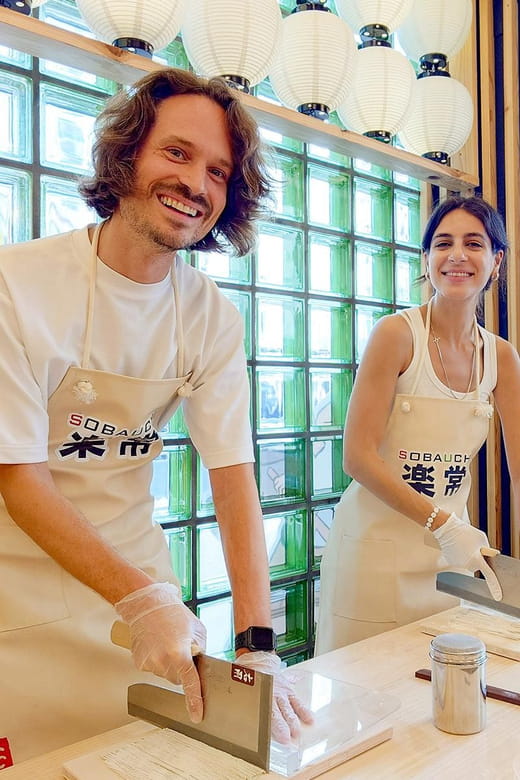
- The soba-making workshop is located in Kappabashi Kitchen Studio in Tokyo and lasts for 1 hour, including 30 minutes for soba cutting and 30 minutes for dining.
- The experience accommodates up to 25 participants and is designed to be inclusive, with accessibility for individuals with mobility challenges.
- Participants will be guided by a seasoned Japanese instructor and use high-quality buckwheat flour from Shinshu, Nagano Prefecture, to create their own soba noodles.
- The dining experience features various soba noodle dishes, including the popular Wagyu Sukiyaki Soba, as well as complimentary beverages and Japanese snacks.
- The workshop’s meeting point is located diagonally across from a food sample specialty store with a large beetle object, and punctuality is essential for a smooth start.
Experience Overview
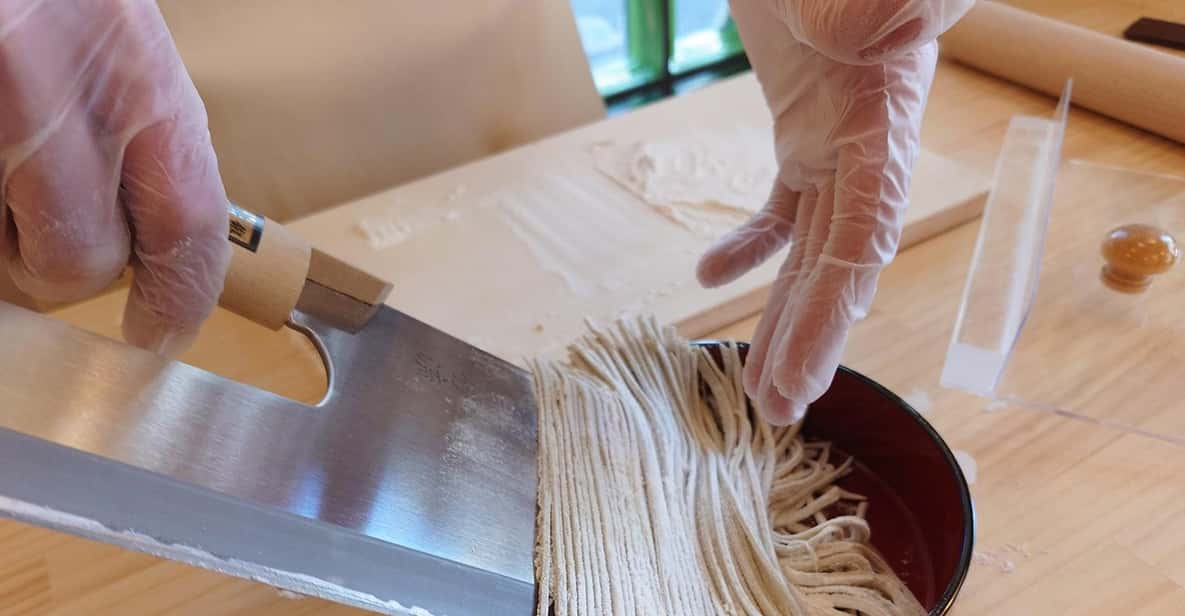
Stepping into the Kappabashi Kitchen Studio, participants embark on a captivating soba-making experience in the heart of Tokyo.
For an hour, they’ll enjoy the art of crafting these delicate buckwheat noodles, from rolling and cutting to boiling and dining. At just $51.40 per person, this hands-on workshop offers a unique glimpse into traditional Japanese cuisine.
The experience includes a 30-minute soba-cutting session followed by a 30-minute dining portion, where participants can savor their freshly made creations alongside a complimentary drink and Japanese snacks.
With a wheelchair-accessible venue and free cancellation up to 24 hours in advance, this soba-making class promises an unforgettable culinary adventure.
You can also read our reviews of more tours and experiences in Taito City.
Accessibility and Capacity
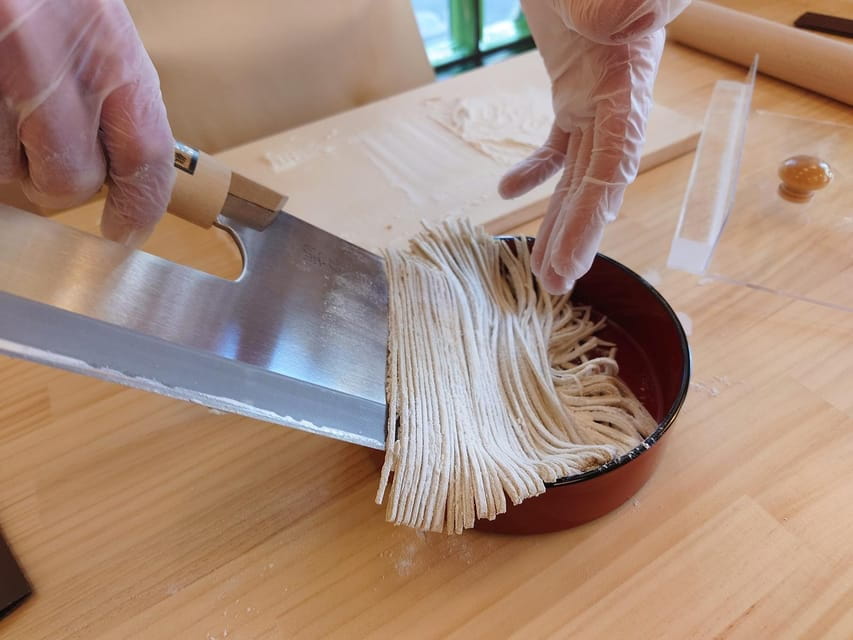
The Kappabashi Kitchen Studio is wheelchair accessible, accommodating up to 25 participants at a time.
This inclusive experience caters to a wide range of visitors, ensuring everyone can enjoy the art of soba making.
The studio’s thoughtful design and flexible capacity make it an ideal choice for:
- Groups of family and friends seeking a hands-on cultural activity
- Individuals with mobility challenges who want to explore traditional Japanese cuisine
- Travelers looking for an engaging and accessible way to learn about soba noodle preparation
With its welcoming atmosphere and commitment to accessibility, the Kappabashi Kitchen Studio offers a truly inclusive soba making experience in the heart of Tokyo.
Soba Making Process
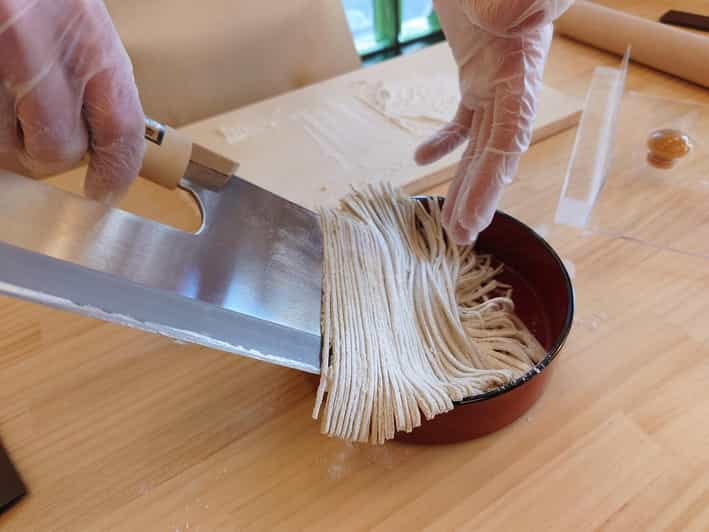
Participants don his apron and prepare to embark on the soba-making journey, guided by the expertise of a seasoned Japanese instructor.
They use high-quality buckwheat flour sourced from Shinshu, Nagano Prefecture, known for its exceptional quality.
The instructor demonstrates the intricate techniques of rolling, cutting, and shaping the dough into delicate soba noodles.
Wielding a large, specially-crafted soba knife, participants carefully slice the dough, their movements precise and rhythmic.
The process is both visually captivating and deeply satisfying, as they witness the transformation of simple ingredients into the beloved Japanese delicacy.
Dining Experience
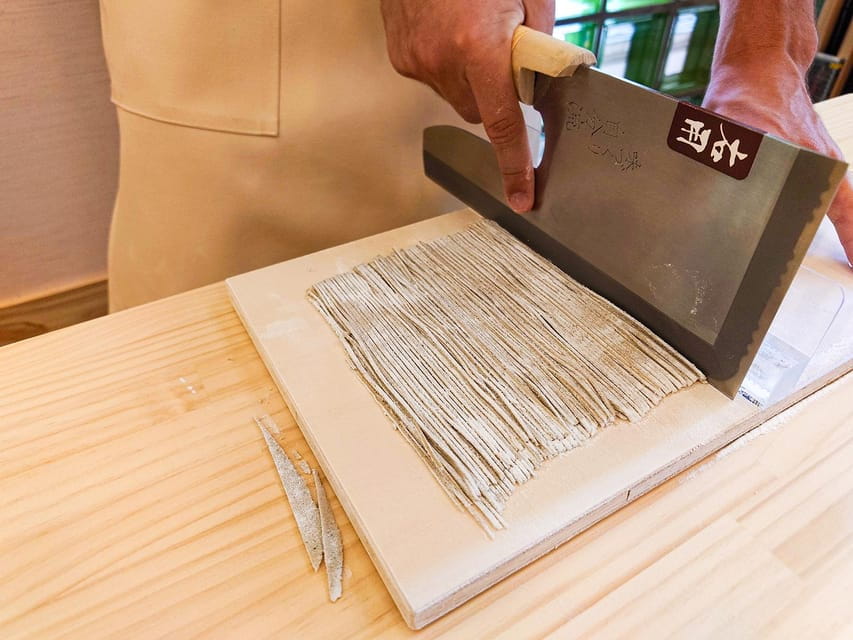
With the soba-making process complete, participants eagerly anticipate the dining experience that awaits.
The menu offers an array of delectable soba noodle dishes, including the popular Wagyu Sukiyaki Soba, the savory Vegan Soba, and the nutty Walnut Soba.
Each dish is served with a complimentary beverage, be it a refreshing beer, a traditional sake, or a thirst-quenching highball.
To further enhance the dining experience, an all-you-can-eat selection of Japanese snacks is provided, allowing guests to savor the flavors of the country’s rich culinary heritage.
- Wagyu Sukiyaki Soba ranked as the most popular flavor
- Vegan Soba and Walnut Soba also highly enjoyed
- Complimentary drinks and all-you-can-eat Japanese snacks included
Important Meeting Point
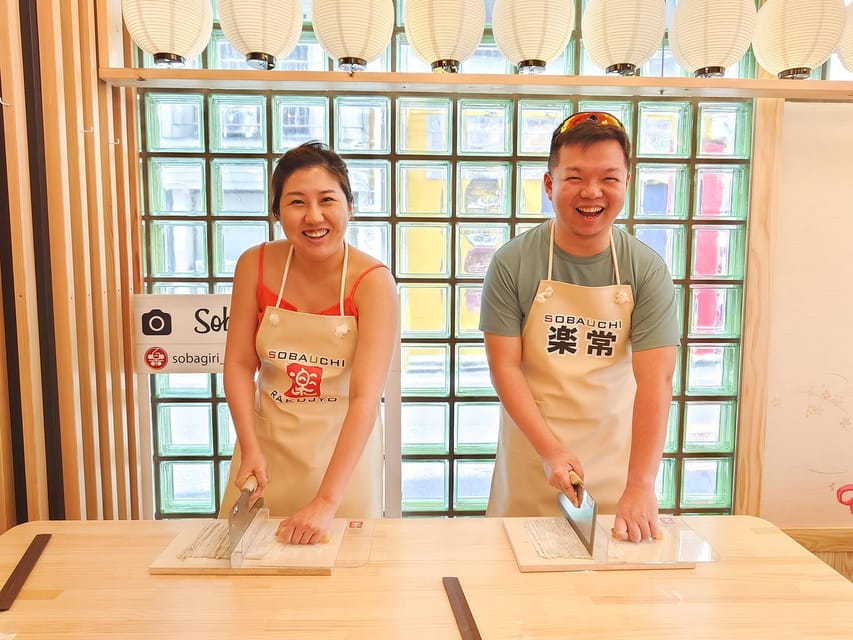
Diagonally across from a food sample specialty store with a large beetle object on Kappabashi Kitchenware Street stands the designated meeting point for this soba-making experience.
Easy to spot, this unique landmark ensures participants won’t miss the start of their culinary adventure. Arriving 10 minutes early is crucial, as the hands-on class begins promptly.
Once gathered, the friendly staff will guide the group through the step-by-step process of crafting authentic Japanese soba noodles. With clear English instructions and a welcoming atmosphere, even first-timers will feel confident in their soba-making skills.
This interactive experience promises to be a highlight of any Tokyo itinerary, immersing visitors in the rich traditions of Japanese cuisine.
- Tokyo Asakusa: Miu Kimono Rental
- Tokyo Kappabashi : Soba Making Experience! The SOBAGIRI
- Asakusa Walking Tour: Tokyo, Culinary Delights and Nature
- Tokyo Asakusa Best Omakase A5 Wagyu Review
- Tokyo: Sumo Show Experience With Chicken Hot Pot and a Photo
- Japanese Paper Notebook and Mizuhiki Belt Bookmark Workshop
Arrival Requirements

Punctuality is paramount for this soba-making experience. Participants must arrive 10 minutes before the reserved time to ensure a smooth start. Latecomers may miss crucial instructions and risk disrupting the carefully orchestrated flow of the class.
Upon arrival, guests will find the meeting point diagonally across from a food sample specialty store with a large beetle object on Kappabashi Kitchenware Street. Timely arrival allows participants to fully enjoy the traditional art of soba-making, from the initial hand-washing ritual to the final savoring of the freshly prepared noodles.
- Arrive 10 minutes before reserved time
- Find the meeting point on Kappabashi Kitchenware Street
- Avoid disrupting the class by being punctual
Participant Responsibility
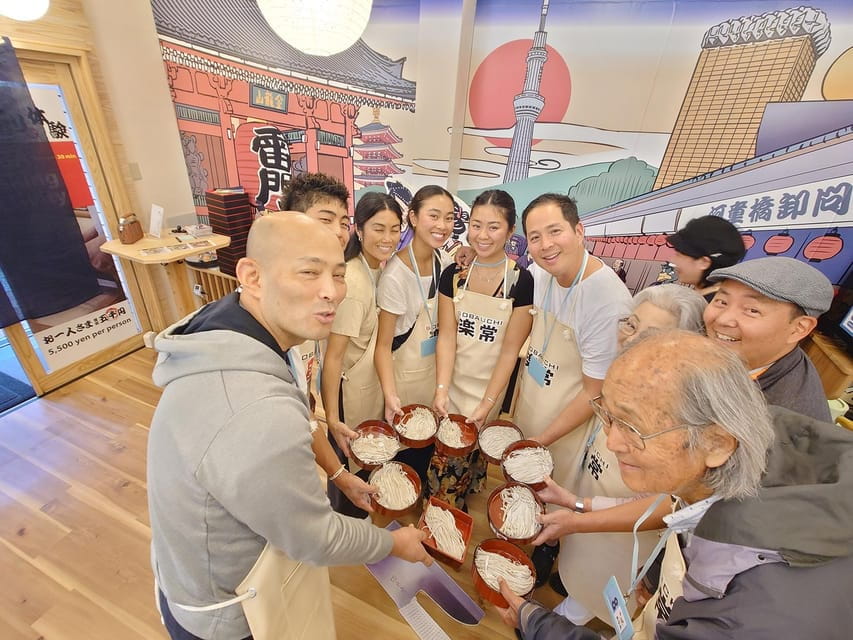
Participants are responsible for their own safety and well-being throughout the soba-making experience. While the instructor and staff will provide guidance, participants must exercise caution when handling sharp knives and hot water. Parents or guardians are held accountable for the actions of their children during the class.
| Safety Considerations | Participant Responsibilities |
|---|---|
| Knife Handling | Use caution, follow instructions |
| Hot Water | Avoid contact, move carefully |
| Personal Belongings | Keep track of personal items |
| Emergency Procedures | Listen to staff directions |
| Allergies | Disclose any known allergies |
Flavor Ranking
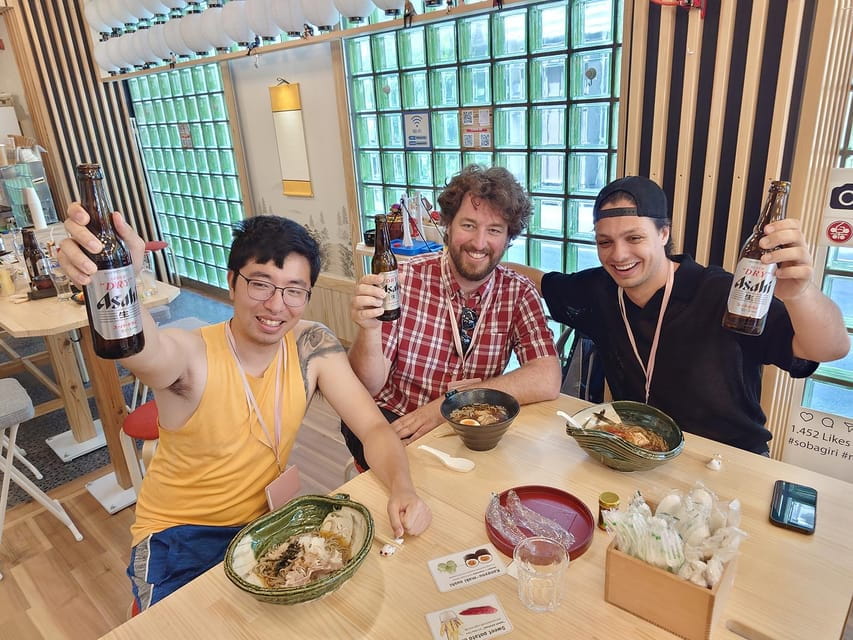
The most popular flavor among participants is the Wagyu Sukiyaki Soba, which takes the top spot. This dish features tender, melt-in-your-mouth wagyu beef simmered in a savory, aromatic broth, served over a bed of freshly made soba noodles.
Second in popularity is the Vegan Soba, a delightful option for those seeking a plant-based experience. The nutty, earthy flavor of the buckwheat noodles is perfectly complemented by the vibrant, umami-rich vegetable toppings.
Rounding out the top three is the Walnut Soba, a unique twist that combines the rich, creamy texture of walnuts with the distinct taste of soba.
- Wagyu Sukiyaki Soba
- Vegan Soba
- Walnut Soba
Frequently Asked Questions
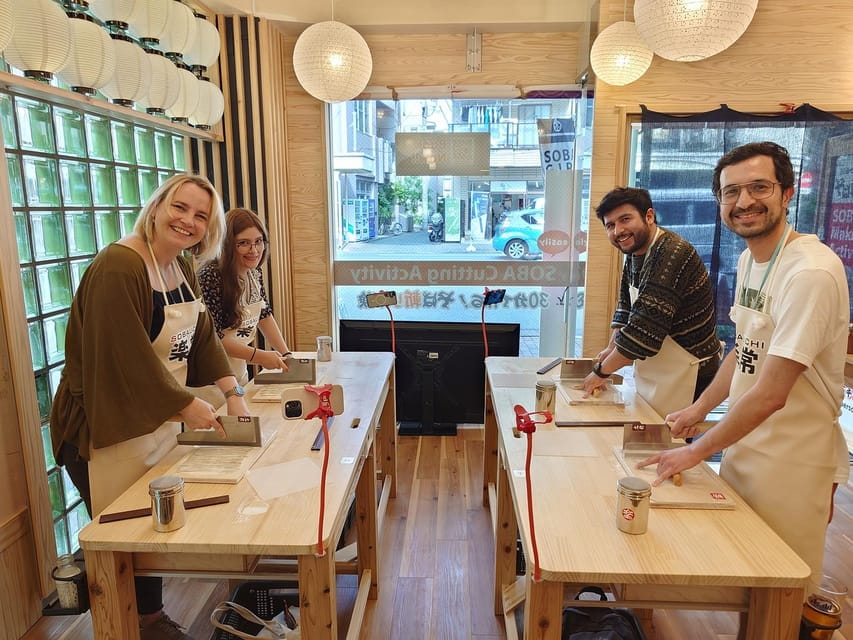
Can Participants Take the Soba Noodles Home?
Unfortunately, participants cannot take the soba noodles they make home. The experience is focused on the cutting, boiling, and dining aspects, with the freshly prepared soba noodles being enjoyed on-site. Participants leave with a newfound appreciation for traditional soba-making techniques.
Is There a Dress Code for the Experience?
There’s no strict dress code for the soba cutting experience. Participants can wear comfortable clothing and shoes. The focus is on the hands-on noodle-making, so casual attire that allows easy movement is recommended for an enjoyable and memorable activity.
Can the Experience Be Done in Multiple Languages?
The soba making experience can be enjoyed in multiple languages. The instructor provides an English audio guide to accompany the Japanese lesson, ensuring participants from all backgrounds can fully enjoy the traditional art of soba cutting.
What Safety Precautions Are in Place During the Cutting?
During the cutting, participants are closely supervised by the experienced instructor. They’re provided with a specially designed soba knife and instructed on proper cutting techniques to ensure safety. Safety is the top priority throughout the hands-on soba-making experience.
Are There Any Discounts or Packages Available for the Experience?
Yes, there are discounts and packages available for the soba cutting experience. Visitors can enjoy group rates for parties of 4 or more, as well as special offers that bundle the activity with other cultural experiences in the Asakusa area.
Recap
The Soba Making Workshop at Tokyo’s Kappabashi Kitchen Studio offers a unique, hands-on cultural experience. Craft delicate soba noodles from scratch, then savor a delicious dining experience featuring various soba dishes. It’s the perfect activity for families and friends, providing an accessible adventure in the heart of Tokyo. Don’t miss the chance to learn about the art of traditional Japanese cuisine!
You can check availability for your dates here:More Tour Reviews in Taito City
- Tokyo Discover All About Samurai Half-Day Guided Tour
- Asakusa Traditional Japanese Sweets Tour Around Sensoji
- Asakusa Private Tour Review: Senso-ji and Skytree
- Tokyo Photo Tour With Professional Photographer Review
- Tokyo: Asakusa Waiking Tour With University Students
- Immersive Japanese Cultural Experience Review
Not for you? Here's more things to do in Taito City we have recnetly reviewed
- Tokyo: Video and Photo Shoot in Asakusa With Kimono Rental
- Tokyo Asakusa Morning Temple and Onigiri Walking Tour
- Tokyo Asakusa Area Feel Buddhism and Shinto Walking Tour
- Tokyo Private Guided Customized Tour Review
- Asakusa Walking Tour With an Experienced Japanese Comedian
- Tokyo Ueno Ameyoko Japanese Food and Sweet Hunting Tour
- Ninja Experience Cafe Asakusa
- Tokyo Private Ueno Historical Tour Review
- Asakusa Cultural Walk & Matcha Making Tour
- Asakusa: Portrait Tour by Professional Photographer
- Tokyo Haneda Airport Transfer Review
